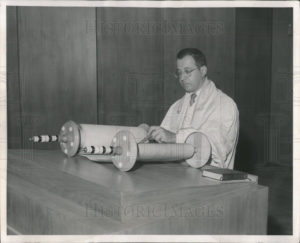 A noted Zionist and Reform leader, Rabbi David Polish of Chicago, warned here today that “there is a changing mood in the American Jewish community” and that “Israeli leaders must pay attention to it.”
A noted Zionist and Reform leader, Rabbi David Polish of Chicago, warned here today that “there is a changing mood in the American Jewish community” and that “Israeli leaders must pay attention to it.”
Addressing the opening session of the 25th national convention of the Labor Zionist Alliance at the Waldorf Astoria Hotel, Polish declared that “Jews are not yet openly critical, but in contrast to their former undeviating assent, they are strongly dissenting in private.”
Polish, a past president of the Central Conference of American rabbis, the rabbinic organization of Reform Judaism, told the several hundred delegates from throughout the country that “there is no proper forum for the discussion of controversial issues in our communities and on a national level.” Several times during his address Polish said that the argument that diaspora Jews have no right to be critical of Israel’s internal affairs no longer holds, “if it ever did.”
He added that “this is an inverted way of stating that diaspora Jews must always approve of Israel’s policies, even when they are being bitterly fought in Israel. The case for this position has become threadbare and discredited. It can be argued persuasively that this course can, and has in fact resulted in growing divisions within American Jewish life. Those divisions can lead to growing alienation. The alienation is due, not so much to honest differences of opinion, but rather to the silencing and discrediting of those who entertain different judgments.”
Cites A Swing To The Right
Polish pointed to a swing to the right not only in American politics, but in Israeli affairs as well as in the Jewish community. The currents in Jewish life, he said, “are running with a tide of Jewish nationalism that reflects the growing retrogression in the world, a retrogression which in the U.S. takes the form of a frenzied effort to tear up by the roots a half century of social achievements.”
The consequences of “this crusade to reverse the clock are already painfully evident,” Polish declared. “The emergence to their fullest dimensions of two Israels has assumed threatening proportions. The confrontation of Sephardi versus Ashkenazi became frighteningly apparent during the last (Israeli) national election.”
According to Polish, “one of the changes of a renewed Zionism in the U.S. will have to affect is to bring the diaspora and Israel more closely together. To the unperceptive, Israel and the diaspora have never been closer. But that has been more apparent than real. A relationship based on unquestioned support is not a healthy relationship. A relationship based on consultation and authentic discourse, even when punctuated by disagreement, is ultimately stronger and more enduring than a contrived unity which collapses in time of stress.”